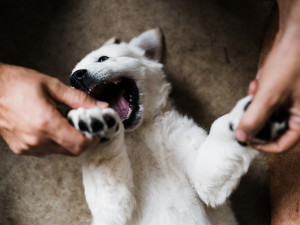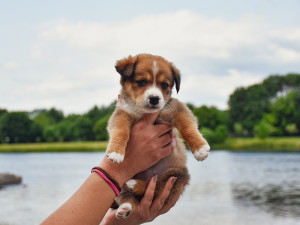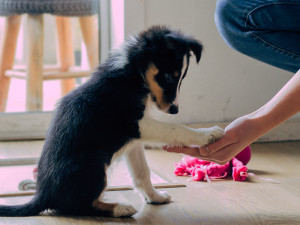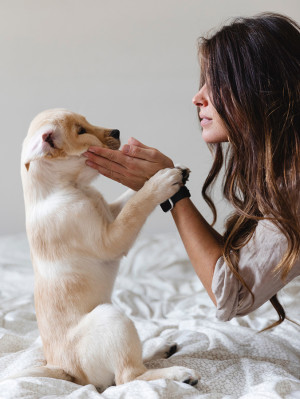When Can Puppies Drink Water?
And why it’s so important to keep them hydrated.
In This Article:
The Importance of Proper Hydration When Can Puppies Start Drinking Water? How to Wean A Puppy Off Milk Frequently Asked Questions
While puppies get most of their hydration from their mother’s milk early in life, they can typically start being introduced to water at three to four weeks old. Here’s how to start the process of weaning puppies off milk and onto water.
The importance of proper hydration
Everyone knows that water is essential for life, but some people try to make it more complicated than it is. If you haven’t experienced a health influencer informing you that you’ll basically rot if you’re not drinking their alkalinized, hyper-oxygenated water enhanced with trace minerals, congrats on your excellent social-media feed curation. While puppies avoid the scourge of specialized water ads, proper hydration is still vital to their growth and wellbeing.
Proper hydration helps with many key bodily functions for puppies, including:
How much do you spend on your pet per year?
Urination: Urinating helps to eliminate byproducts from bodily functions. Proper hydration lets the kidneys do their part in getting rid of the body’s waste.
Digestion: The stomach and intestines need fluid to break down food into usable nutrients. The gastrointestinal tract is one of the first areas affected by dehydration.
Defecation: The colon and rectum are surprisingly important in maintaining fluid balance in the body. Too little water intake, and poop becomes hard and dry, leading to constipation. Too much water intake, and the colon’s ability to absorb water is overwhelmed, leading to diarrhea.
Nutrient delivery: Proper hydration helps to maintain blood pressure, making the heart’s job easier. Normal blood flow allows appropriate delivery of oxygen and nutrients to maintain growth.
Body temperature maintenance: Puppies depend on the environment, mom, and their littermates for warmth in the first weeks of life. Staying hydrated is a key part of body temperature regulation as pups become more independent.
When can puppies start drinking water?
Puppies can be introduced to water as they’re weaned off milk. When do puppies wean off milk? Most puppies begin the weaning process at about three to four weeks of age. There are a lot of opinions about when the exact right time to wean is, but most dogs fit in this time frame. Toy-breed dogs may not show interest until closer to four weeks of age, but most other dogs can be introduced to food and water a few days earlier.
Puppies that are still nursing will usually get all the water they need from mom, or a puppy milk replacer if they’re being bottle fed. Most puppies will not show much interest in water initially because the first food offered to them will be very watery.
Puppies will likely play in the water even if they’re not drinking it. This is normal and expected. Make sure that the water offered to weaning puppies is in a very shallow container, such as a low-lipped baking sheet. It’s important that they have access to water without the risk of drowning. As the puppies progress though the weaning process and graduate to eating more solid food, they should show interest in drinking water on their own.
How to wean a puppy off milk
In the wild, Mom begins regurgitating partially digested food when puppies reach weaning age. This moistened, pre-chewed food is great and easy for toothless puppies to eat, but it’s pretty gross to have in your home. Fortunately, people can intervene by making their own “vomit” for weaning puppies.
When puppies are about 21 to 28 days old, you can begin the weaning process. The easiest way to start is by soaking puppy kibble in water, letting it sit until everything is mushy, then mashing it up. Early in the weaning process, this should be a very loose consistency (think watery grits or Cream of Wheat).
Over a period of weeks, make the consistency of the food progressively firmer, until the puppies are eating dry food at about eight weeks of age. Make the transition in texture gradual so puppies can get used to chewing as their baby teeth come in. Keep water available so the puppies can stay hydrated on their own as their food becomes less watery.
It’s best to work with your veterinarian throughout the newborn puppy process so that you can receive personalized advice, especially if it’s your first time raising newborn puppies. Some common questions about how to wean puppies off mother’s milk that often come up include:
When can I wean puppies off milk?
Puppies can start to be weaned off their mother’s milk or a bottle when they’re about three or four weeks old. As they get more and more of their nutrition from solid food, they’ll need less and less from mom. Puppies are usually fully weaned by about six to eight weeks of age.
When can puppies drink water and eat food?
Puppies can be introduced to water and watery food when they’re starting to be weaned, at about 21 to 28 days old. They may not show much initial interest in drinking because of the amount of water they’re getting from their mom’s milk. They should be allowed to experiment with water in a shallow bowl at the same age so that they’re ready to drink as the amount of liquid in their diet decreases.
How much do I feed puppies being weaned off milk?
Feeding amounts will vary based on the breed or size of the puppies, the calorie content of the food, and how watered down the food is. Consult the puppy food company’s feeding guide and work with your veterinarian to make sure you’re providing an appropriate amount as your puppies grow.
Throughout nursing and weaning, it’s important to check newborn puppies’ weights twice a day to make sure they’re gaining five to 10 percent of their birth weight daily and not falling behind on nutrition or hydration.
When can puppies drink water from a bowl?
Puppies should initially be offered water in a shallow pan or low-walled dish when they begin weaning at about three to four weeks old. As they grow and become less clumsy, the water can eventually be put into a bowl appropriate for their size.
Gradual vs. abrupt weaning approaches
Gradual weaning is generally easiest on the pups and mom. Some mothers may cut their puppies off of milk abruptly once sharp baby teeth come in, but most will allow occasional nursing as the puppies begin weaning. Abrupt weaning can lead to stomach upset for the puppies and mammary issues for mom, but it may be necessary in some cases due to health or environmental factors.
Puppy weaning tips
Start with offering puppy mash for a limited time four times a day. Don’t leave extra food out after the puppies have lost interest — stick to meal feedings. Reduce to feeding three times a day at around eight weeks old for most breeds. Toy breeds may need to continue more frequent feedings for a longer time due to possible issues with developing low blood sugaropens in new tab.
Most mothers will naturally begin to discourage their puppies from nursing during weaning. Puppies may still latch on a couple times a day up to eight weeks of age, but the hope is that mom will tell them nope more and more as those sharp puppy teeth start to come in. It’s vital to continue tracking puppy weights during this phase to make sure everyone’s getting enough nutrition.
Feed puppy mash in a flat bowl or pan that has been propped up, so it’s at an angle that the puppies can easily access laying down. They’re used to eating while laying on their bellies from nursing, so it’s easier to start them off this way and gradually lower the angle of the dish so they eventually learn to stand while eating.
Warm the food in the microwave before feeding. Microwaves can have hot spots, so be sure to mix food thoroughly after it’s been warmed and test it to make sure it’s lukewarm. They’re used to drinking milk at body temperature, so it shouldn’t be steaming hot. Puppies can be burned by food that is too hot.
Many litters have a puppy or two that is slow to realize that food is good. You can encourage them by offering a little bit of food off your finger. Most will figure out what they’re supposed to do pretty quickly and join their littermates in chowing down. You can also withhold milk for three hours beforehand to improve their appetite. This can be done by separating them from Mom for a short while.
Giving each puppy their own bowl can help you make sure that everyone is getting their fair share of food. This can also help spot puppies that may be having some stomach upset before symptoms progress.
Report any problems to your vet as soon as possible. Issues like vomiting, diarrhea, lethargy, or failure to gain weight can cause big problems for small puppies, so it’s best to catch things before a puppy is very sick.
FAQs (People also ask):
Why does my dog drink so much water?
Some dogs naturally drink a lot of water due to their metabolism and activity level. An unexplained increase in your dog’s water consumption could indicate a health problem like diabetes or Cushing’s disease.
When can a puppy eat solid food?
Puppies can be started on a mash of solid food at about three to four weeks old. They’re usually ready to eat unmoistened food by about eight weeks of age.
References:
OAVT Conference: Nutrition in Dog & Cat Reproduction: How to Tackle Frequent Misconceptions
A Review of Maternal Behaviour in Dogs and Potential Areas for Further Researchopens in new tab













